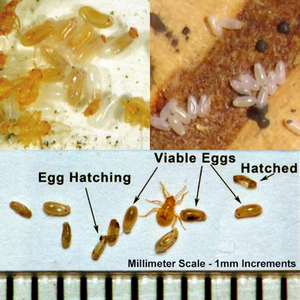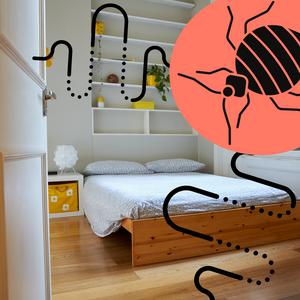Does Coconut Oil Keep Bed Bugs Away?

 With the costly treatments needed to deal with bed bugs, many are searching for a more affordable and natural way to get rid of bed bugs. Others wonder if they can use rubbing alcohol, vinegar, along with other items they can find at home. However, one of the most popular natural alternatives is the use of coconut oil.
With the costly treatments needed to deal with bed bugs, many are searching for a more affordable and natural way to get rid of bed bugs. Others wonder if they can use rubbing alcohol, vinegar, along with other items they can find at home. However, one of the most popular natural alternatives is the use of coconut oil.
So, does coconut oil keep bedbugs away? Based on a recently published bulletin by the US Department of Agriculture, certain compounds from coconut oil were found more effective than DEET when it comes to repelling some insects, including bed bugs.
This study highlights that the fatty acids from coconut oil provided long-lasting repelling properties against insects such as mosquitoes, ticks, flies, and as mentioned, bed bugs. The lead researcher also emphasizes that it is not the oil itself that was effective in repelling these insects, but the compounds derived from it. This means that using the oil alone will not work as a repellent.
All of the findings from the research are significant due to the safety concerns surrounding the use of DEET, which is an insect repellent that was first used during World War II. The chemical was found to be effective in repelling insects, but its use comes with serious side effects such as disorientation, rashes, and even worse, seizures. With this in mind, it was banned from products with DEET containing more than 30% of the chemical.
How this Oil Repels Bed Bugs Better than Other Natural Options
Though there are a lot of herbal and natural repellents available, these options were not very effective in attaining desired results. Most of the time, natural repellents lose their repellence quickly. However, this wasn’t the case with the compounds found in coconut oil.
Based on the study, the oil performed better than DEET in repelling flies, showing an effective rate of more than 95% compared to the 50% effective rate of DEET. It was also found to repel ticks and bed bugs for two weeks, unlike the three-day effectiveness of the synthetic compound. However, it was also stated in the study that it requires great acid concentration from the oil to keep mosquitoes away unlike DEET.
Though there are still no products with such compounds used as ingredients, researchers are hopeful to see coconut oil-based bed bug repellents as well as repellants for other insects in the future. Coconut fatty acids are known as non-toxic and are already widely used in the cosmetic and food industries.
How to Take Advantage of Essential Oils When Dealing with Bed Bugs and Other Insects
Before the aforementioned study, there were already different ways on how people use coconut oil when dealing with bed bugs and other insects. One of the many popular uses is applying coconut oil on bed bug bites. The healing and soothing properties found in the oil are not only used for relieving the discomfort of itchy bed bug bites, but for other insect bites as well.
With the promising results that compounds from the oil can provide to repel insects, it can actually become a part of your pest control strategy. When used with a certain treatment that kills bed bugs, it can help you to deal with the pesky critters while they are in hiding. As the bugs are hiding, you can start treating common hiding spots such as:
- The bed frame
- Mattresses and box springs
- Cracks and crevices
You can potentially kill not only the adult bed bugs but their eggs. Taking advantage of the situation while these critters are hiding is possible by covering every nook and cranny with diatomaceous earth.
For Bites
As a carrier oil, you can use coconut oil along with other pure oil extracts to relieve the bites caused by these critters. Some of the oil mixtures you can use are:
- Lavender Essential Oil
Authentic versions of this oil can help soothe the discomfort associated with the bites. You can apply it undiluted or with a carrier oil. A single drop can go a long way so you can get the most out of a bottle of pure lavender oil.
- Frankincense Oil
It not only soothes bites but uplifts your mood. So, if you’re feeling down or worried about all the things that must be done because of your bed bug problem, then you can stock up with this oil.
- Tea Tree Oil
This particular oil is also known for its antibacterial properties and can help in soothing the bites and other associated effects.
You can stack up some of these oils along with coconut oil or you can just use them as is and get the most of its benefits.
For Repelling
The use of oil derived from coconuts may not resolve a bed bug infestation completely, but it can be used for repelling them along with other essential oils like:
- Citronella Oil
This popular oil is used in many commercially sold bug repellents. It may smell fresh and lovely, but household bugs stay away from it. This is an alternative to DEET in repelling any insects. In fact, it is so potent that EPA-banned products with citronella concentrations that are more than 10%. As you wash and dry your bedding, you can spray this oil on your bedding and all around your bed.
- Peppermint and Eucalyptus Oil
You can use these oils not only for the fresh and relaxing aroma that it gives off but also in repelling insects such as bed bugs. To use these oils, you can soak cotton balls with any of these oils and put them in areas where the bugs may find access to reach you. Spraying it all over your mattress or diffusing it is an easier way of keeping the pesky critters away.
Learn more recipes for repelling bed bugs using these oils here.
Though coconut oil has shown potential in keeping bed bugs away, it is not enough to prevent an infestation from getting worse. Depending on the level of the infestation, you can resort to calling pest control professionals or perhaps using bed bug products. Find high-quality bed bug products that you can use at home and control an infestation at bedbugsos.ca.







